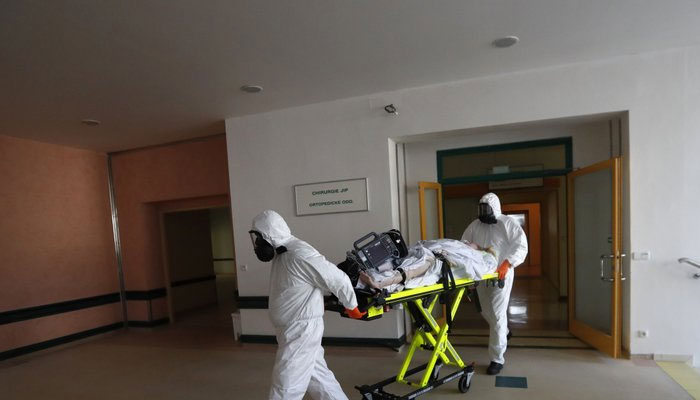Czechs running out of hospital capacity
PRAGUE: The Czech Republic is reaching capacity in intensive care wards as coronavirus infections keep soaring in the EU’s worst-hit country, the health ministry said on Tuesday.
The country tops the world in terms of new infections per 100,000 people over the last 14 days and is second after neighbouring Slovakia for deaths, according to an AFP tally. The government, which tamed the spread during the first wave early last year, has been grappling with recurrent upswings since the summer of 2020 in the country of 10.7 million people.
“We’re getting close to running out of intensive care capacity,” Deputy Health Minister Vladimir Cerny told reporters, blaming a lack of qualified staff in the first place. “In no way can we maintain the current standards of health care and there is a slowdown and postponements in non-Covid care. The system as a whole is close to its limit,” he added.
On Tuesday, the Czech Republic registered more than 1,300 patients in intensive care, including 660 on ventilators and “a higher number” on life support, said Cerny. The EU member state has registered over 1.16 million cases and more than 19,500 deaths since the pandemic began.
Cerny said the government should now formally ask neighbouring Germany to accept patients mainly from hard-hit western Czech regions. Two weeks ago, Health Minister Jan Blatny reaped criticism for turning down an offer from Germany to help relieve an overburdened hospital in the westernmost city of Cheb.
Cerny said the government was not planning to use a field hospital in the second city of Brno. Another field hospital in Prague has been dismantled after never being used. To step up its measures, the government has ordered people to wear FFP2 face masks or better — or two ordinary face masks — in public buildings, shops and at public transport stops from next Thursday.
It shuttered three districts reporting a rapid spread earlier this month. Restaurants, cinemas, theatres and most shops remain closed, as do schools, with the exception of kindergartens and the first two years of elementary school. Meanwhile, Scotland will look to begin a “substantial” easing of coronavirus restrictions from April 26, First Minister Nicola Sturgeon said on Tuesday as she laid out plans to take the country out of lockdown.
The head of Scotland’s devolved government told lawmakers there were “much brighter times ahead”, adding that restrictions were working well alongside a mass vaccination programme that was “motoring”.
“We can now see a firm way out of this if we all stick together and stick with it,” she added. The first minister, whose government has devolved powers over health policy, indicated the lifting of restrictions on non-essential business would be more cautious than plans outlined for England by UK Prime Minister Boris Johnson on Monday.
“From 26th April, assuming the data allows, we will move back to levels with hopefully all of Scotland, that is currently in level four moving to level three,” she said.
“At that stage, we will begin to reopen the economy and society in the more substantial way that we are all longing for,” Sturgeon added, explaining the situation was “extremely positive and promising” but “still quite precarious”.
Johnson on Monday outlined a four-step plan to ease lockdown measures in England, with schools opening again to pupils from March 8, and non-essential retail from April 12.
In a related development, Dutch Prime Minister Mark Rutte announced on Tuesday that the controversial overnight curfew imposed to slow the spread of the coronavirus was being extended until March 15.
The government will say on March 8 whether it intends to extend the curfew beyond March 15, the date of the first day of legislative elections, Rutte told reporters. The curfew, in force since January 23, has already provoked violent protests and a challenge in the courts.
-
 Woman Jailed Over False 'crime In Space' Claim Against NASA Astronaut
Woman Jailed Over False 'crime In Space' Claim Against NASA Astronaut -
 James Van Der Beek’s Close Pal Reveals Family's Dire Need Of Donations
James Van Der Beek’s Close Pal Reveals Family's Dire Need Of Donations -
 Prince William And Harry's Cousins Attend 'Wuthering Heights' Event
Prince William And Harry's Cousins Attend 'Wuthering Heights' Event -
 Hailey Bieber Turns Heads Just Hours After Major Business Win
Hailey Bieber Turns Heads Just Hours After Major Business Win -
 King Charles' Andrew Decision Labelled 'long Overdue'
King Charles' Andrew Decision Labelled 'long Overdue' -
 Timothee Chalamet 'forever Indebted' To Fan Over Kind Gesture
Timothee Chalamet 'forever Indebted' To Fan Over Kind Gesture -
 Columbia University Sacks Staff Over Epstein Partner's ‘backdoor’ Admission
Columbia University Sacks Staff Over Epstein Partner's ‘backdoor’ Admission -
 Ozzy Osbourne's Family Struggles Behind Closed Doors
Ozzy Osbourne's Family Struggles Behind Closed Doors -
 Dua Lipa Claims Long-distance Relationship 'never Stops Being Hard'
Dua Lipa Claims Long-distance Relationship 'never Stops Being Hard' -
 BTS Moments Of Taylor Swift's 'Opalite' Music Video Unvieled: See Photos
BTS Moments Of Taylor Swift's 'Opalite' Music Video Unvieled: See Photos -
 Robin Windsor's Death: Kate Beckinsale Says It Was Preventable Tragedy
Robin Windsor's Death: Kate Beckinsale Says It Was Preventable Tragedy -
 Rachel Zoe Shares Update On Her Divorce From Rodger Berman
Rachel Zoe Shares Update On Her Divorce From Rodger Berman -
 Kim Kardashian Officially Takes Major Step In Romance With New Boyfriend Lewis Hamilton
Kim Kardashian Officially Takes Major Step In Romance With New Boyfriend Lewis Hamilton -
 YouTube Tests Limiting ‘All’ Notifications For Inactive Channel Subscribers
YouTube Tests Limiting ‘All’ Notifications For Inactive Channel Subscribers -
 'Isolated And Humiliated' Andrew Sparks New Fears At Palace
'Isolated And Humiliated' Andrew Sparks New Fears At Palace -
 Google Tests Refreshed Live Updates UI Ahead Of Android 17
Google Tests Refreshed Live Updates UI Ahead Of Android 17




